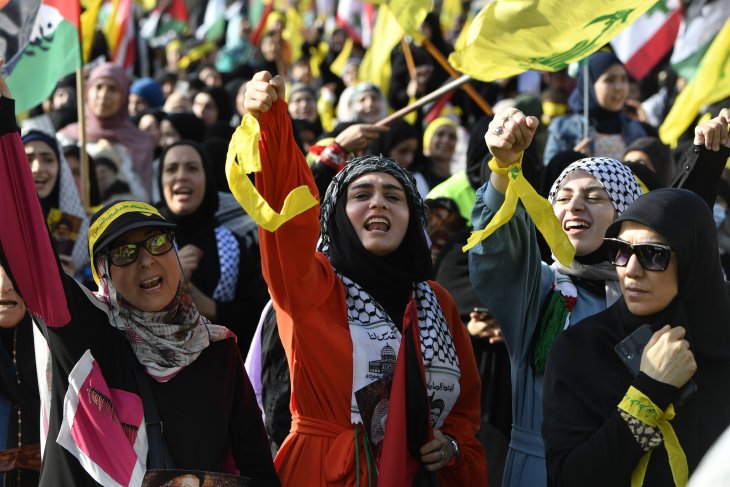In 1982, Israel invaded Lebanon in order to drive out the Palestine Liberation Organization (PLO). The invasion marked the start of a dangerous balance of terror between Israel and Hezbollah.

Hundreds of people gather to follow the speech of Hezbollah Secretary General Hassan Nasrallah, on a screen, in Beirut, Lebanon on November 3, 2023. Photo: Houssam Shbaro/Anadolu via Getty Images
Lebanon held its breath on Friday 3 November. People stood by their packed suitcases, ready to travel to the airport to leave the country.
Even Lebanon’s prime minister, Najib Mikati, sat in front of the television, waiting to find out whether the country he leads was at war. Then Hassan Nasrallah, leader of Hezbollah, the world’s most heavily armed non-state actor, came to the lectern.
War was off – for now. Nasrallah congratulated Hamas and added that this was the Palestinians’ war. Hezbollah had known nothing about the attacks on 7 October. Hezbollah would keep Israel in check in the north, but nothing in Nasrallah’s speech signalled an escalation. Every day that passes with minor clashes, there is a risk that an attack by one side could trigger massive retaliation and destroy the balance of terror between Israel and Hezbollah.
Today, Hezbollah is effectively holding Lebanon hostage. It can do so for two reasons. First, because Hezbollah is so powerful. Second, because the Lebanese state is so weak.
A bandit state
Corruption within Lebanon’s political institutions and state agencies has been systemic ever since the end of the civil war in 1990. When Lebanon’s warlords laid down their weapons after 15 years of civil war and 150,000 deaths, they did so in return for a promise that they would be given control of the state, rather than be prosecuted for war crimes.
Regardless of the composition of Lebanon’s elected parliament, every government, as well as every single institutional organ, from local councils to the diplomatic corps, as well as positions in privatized companies and so on, is divided up between the former warlords’ political factions.
The result is that the leaders of the Sunni Muslim, Shiite Muslim, Druze and various Christian denominations, always get their share of the cake. As a consequence, these leaders have developed a peculiar understanding of politics: to them, politics is about serving their loyal supporters, not the population in general. And in order to provide for the members of their factions, their incomes, including their personal incomes, are channelled through the political positions they control.
This corruption is a source of huge popular discontent. But as was said during the demonstrations of autumn 2019: “You can’t protest against a state that doesn’t exist.” Large parts of the population hate the sectarian system, while at the same time they are dependent on their leaders for protection in a country where one never knows when underlying sectarian conflicts will flare up again.
Opposition to sectarianism has been less widespread, however, among Lebanon’s Shiite Muslims. The reason is that after the Iranian revolution of 1979 and the emergence of Hezbollah, the Shiites, who had previously been a marginalized and sometimes despised underclass, experienced an upturn in their status.
A Hezbollah state
In 1982, Israel invaded Lebanon in order to drive out the Palestine Liberation Organization (PLO). The occupation of south Lebanon caused tens of thousands of Shiites to become internally displaced, with many fleeing to al-Dahya, a slum area south of Beirut. Hezbollah, ‘God’s party’, was founded to fight against the Israeli occupation. When Israel withdrew from Lebanon after 18 years of occupation, it was as a result of Hezbollah’s resistance.
Hezbollah became hugely popular, including for its social and cultural activities. In Shiite areas, such as al-Dahya, a Hezbollah state emerged. The Hezbollah movement, bankrolled by Iran, had its own hospitals and healthcare institutions, schools, fuel stations and shops, charitable organizations for the relief of poverty, police and intelligence services, prisons, banks, construction companies, scout groups and even Lebanon’s best football team.
The political wing of the movement came to put its stamp on Lebanese politics. In 2018, when Hezbollah won the general election, the group gained control over state institutions, including the health ministry. As a result, Hezbollah gained the ability to finance its own hospitals directly from state funds. At the same time, the movement’s military control over south Lebanon is almost total. Accordingly, the movement’s alliance with Iran is to both parties’ advantage.
Iran has created Hezbollah as a mini-state that is more powerful than the Lebanese state. But Iran does not wish to destroy its most important military front against Israel.
A dangerous balancing act
According to an opinion poll published by The Economist, 68 percent of Lebanese do not want war with Israel. Even a majority of Shiites, 51 percent, oppose a war. A war could cause hundreds of thousands of Shiites to flee from south Lebanon and al-Dahya towards the Christian and Sunni heartlands in the north. This could cause huge sectarian tensions and potentially violent conflict. War could cause both the Lebanese state and the country’s economy to collapse.
If Hezbollah does not go ‘all-in’ for war, then the balance of terror is the most important reason. Hezbollah, with its trained soldiers and 150,000 missiles, is Iran’s strongest card to prevent an Israeli or American attack on Iran’s nuclear facilities. Hezbollah is Iran’s most important regional defensive bulwark, and a war would weaken it.
For this reason, Hezbollah’s strategy is controlled escalation. They must engage militarily in order to maintain their credibility among their anti-Israeli supporters, but they must avoid losing control of the violence and triggering full-scale war. This is a dangerous balancing act.
- Dag Henrik Tuastad is Associate Professor of Middle East Studies at the University of Oslo and former PRIO researcher.
- This text was first published in Norwegian by Aftenposten 14 November 2023
- Translation from Norwegian: Fidotext